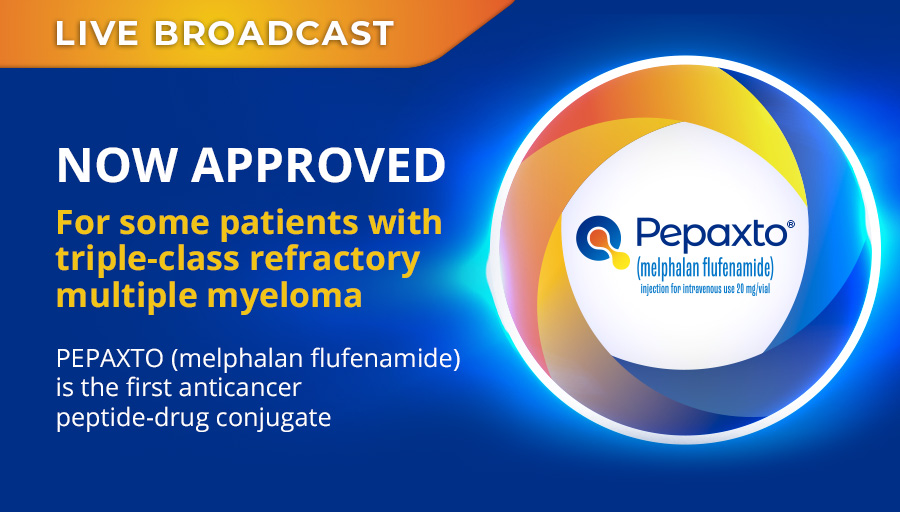|
|
|
|
|
|
INDICATION
PEPAXTO is indicated in combination with dexamethasone for the treatment of adult patients with relapsed or refractory multiple myeloma who have received at least four prior lines of therapy and whose disease is refractory to at least one proteasome inhibitor, one immunomodulatory agent, and one CD38-directed monoclonal antibody. This indication is approved under accelerated approval based on response rate. Continued approval for this indication may be contingent upon verification and description of clinical benefit in a confirmatory trial.
Limitation of Use
PEPAXTO is not indicated and is not recommended for use as a conditioning regimen for transplant outside of controlled clinical trials.
|
|
IMPORTANT SAFETY INFORMATION
PEPAXTO is contraindicated in patients with a history of serious allergic reaction to melphalan flufenamide or melphalan.
PEPAXTO may cause thrombocytopenia, which may lead to hemorrhage. Monitor platelets at baseline, during treatment, and as clinically indicated. Monitor more frequently during the first 2 months of treatment with PEPAXTO. Do not administer PEPAXTO if the platelet count is less than 50 x 109/L. Withhold PEPAXTO until platelet count is 50 x 109/L or greater and resume at same or reduced dose based on duration of interruption. Adjust dose and/or dose schedule based on signs and symptoms of bleeding.
See additional safety information below.
|
|
|
|
Learn About PEPAXTO:
A Newly Approved Peptide-Drug Conjugate for Some Patients With Triple-Class Refractory Multiple Myeloma |
|
|
Join OncLive® and Oncopeptides on Tuesday, April 13 at 6pm ET or 8:30pm ET, or on Wednesday, April 14 at 12pm ET or 3pm ET, for a live broadcast featuring key experts, Dr. Mikhael and Dr. Richter, for a live discussion and Q&A session.
|
|
|
|
In this Live Broadcast, Dr. Mikhael and Dr. Richter will: |
|
|
|
|
Explore the role of PEPAXTO in combination with dexamethasone, the first anticancer peptide-drug conjugate for adult patients with relapsed or refractory multiple myeloma who have received at least four prior lines of therapy and whose disease is refractory to at least one proteasome inhibitor, one immunomodulatory agent, and one CD38-directed monoclonal antibody
|
|
|
|
|
|
|
|
|
Review the key clinical data for PEPAXTO in combination with dexamethasone
|
|
|
|
|
|
|
|
|
Discuss safety, dosing, and administration of PEPAXTO
|
|
|
|
|
|
|
|
|
Address the challenges of treating some patients with triple-class refractory multiple myeloma
|
|
|
|
|
|
Joseph Mikhael, MD
Professor, Applied Cancer Research and Drug Discovery
Translational Genomics Research Institute (TGen)
City of Hope Cancer Center
|
|
|
Joshua Richter, MD
Assistant Professor of Medicine, Tisch Cancer Institute
Icahn School of Medicine at Mount Sinai
Director of Multiple Myeloma
Blavatnik Family – Chelsea Medical Center at Mount Sinai
|
|
|
|
|
To learn more about PEPAXTO, visit www.pepaxtohcp.com.
IMPORTANT SAFETY INFORMATION (continued)
PEPAXTO may cause neutropenia, which may lead to infection. Monitor neutrophil counts at baseline, during treatment, and as clinically indicated. Monitor more frequently during the first 2 months of treatment with PEPAXTO. Do not administer PEPAXTO if absolute neutrophil count is less than 1 x 109/L. Withhold PEPAXTO until absolute neutrophil count is 1 x 109/L or greater and resume at same or reduced dose based on duration of interruption. Consider leukocyte growth factor as clinically appropriate.
PEPAXTO may cause anemia. Monitor red blood cell counts at baseline, during treatment, and as clinically indicated. Monitor more frequently during the first 2 months of treatment with PEPAXTO. Treat anemia as clinically indicated. Dosage modification and dose delay of PEPAXTO may be required to allow for recovery of red blood cells.
Patients taking PEPAXTO experienced infections, including fatal infections. Consider antimicrobials as clinically appropriate.
Nonclinical safety studies with melphalan flufenamide at dosages exceeding the recommended dose for PEPAXTO were associated with mortality. The safety and efficacy of PEPAXTO has not been established for use as a conditioning regimen in patients receiving transplant.
Secondary malignancies such as myelodysplastic syndromes or acute leukemia have been reported in patients with multiple myeloma who were treated with PEPAXTO. Monitor patients long term for the development of secondary malignancies.
Based on its mechanism of action, PEPAXTO can cause fetal harm when administered to a pregnant woman because it is genotoxic and targets actively dividing cells. Advise pregnant women of the potential risk to a fetus. Advise females of reproductive potential to use effective contraception during treatment with PEPAXTO and for 6 months after the last dose. Advise males with female partners of reproductive potential to use effective contraception during treatment with PEPAXTO and for 3 months after the last dose.
The most common adverse reactions (≥20%; Grade 1-4) were fatigue (55%), nausea (32%), diarrhea (27%), pyrexia (24%), and respiratory tract infection (24%).
Special Considerations
Use in Pregnancy
Based on the mechanism of action, PEPAXTO can cause fetal harm when administered to a pregnant woman. There are no available data on PEPAXTO use in pregnant women to evaluate for a drug-associated risk. PEPAXTO is a genotoxic drug. Advise a woman of childbearing potential of the potential risks to the fetus.
Lactation
There is no information regarding the presence of melphalan flufenamide or its metabolites in human breast milk, or the effects on the breastfed child or on milk production. Because of the potential for serious adverse reactions in a breastfed child, advise women not to breastfeed during treatment with PEPAXTO and for 1 week after the last dose.
Females and Males of Reproductive Potential
PEPAXTO can cause fetal harm when administered to a pregnant woman. Advise females of reproductive potential to use effective contraception during treatment with PEPAXTO and for 6 months after the last dose.
PEPAXTO may damage the developing male germ cells, resulting in possible genetic fetal abnormalities. Advise males with a female partner of reproductive potential to use effective contraception during treatment with PEPAXTO and for 3 months after the last dose.
PEPAXTO can cause amenorrhea in premenopausal women and result in infertility. Based on findings of melphalan flufenamide in animals, PEPAXTO may impair male fertility. Alkylating drugs, such as PEPAXTO, can also cause irreversible testicular suppression in patients.
Please see accompanying full Prescribing Information.
Please click here for full Prescribing Information.
|
|
© 2021 03-21 US--2000059
Oncopeptides, Inc. 200 Fifth Avenue,
Suite #1030 Waltham, MA 02451
|
|
|
|
|
|
|
|
|





